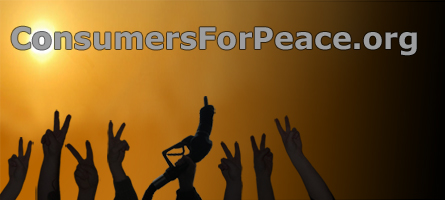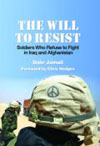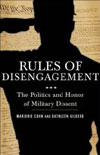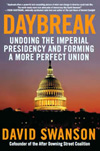"War is for Power and Money" Church Visit #22
By Nick Mottern and Nora Freeman
A 78-year-old Army veteran sat in the parish house of the First Baptist Church in White Plains NY at social hour on Sunday, May 24, 2009, Memorial Day weekend, and told me he has come to the conclusion that wars are only about getting power and money.
He was a medic during the Korean War although he was not in combat. Later, after higher education, he worked on the nuclear reactor of the USS Nautilus, the first US nuclear submarine. But while he said Memorial Day brought memories, he is no supporter of war. In fact he thinks mercenaries are being paid to start wars.
He was thankful for the GI benefits that enabled him to go to college, something that he would not otherwise have been able to afford, but he acknowledged that there are other ways the government could have helped him through school.
His comments came in response to my question about what he thought of our group – Martha Conte, Gayle Dunkelberger, Margaret Eberle, Nora Freeman, Debbie Kair and I – having brought our bannering campaign to his church in our effort to increase resistance among clergy and laity in Westchester County to the wars in Iraq and Afghanistan.
We visited his church on a mildly cloudy, cool morning. The church building is a brick colonial style with a high, sharp spire, set on wide lawns of what was the estate of Mrs. Roy Ott, sister of J.C. Penney, of department store fame and a Baptist. Charles E. Wilson, a former head of General Electric and a member of First Baptist, bought the property for the church. The Ott home is now the church’s parish house and called Wilson House.
It being a holiday weekend, the congregation amounted to only about 50 people, sitting mostly at the rear of the simply decorated white sanctuary, with light pastel trim and textured clear glass windows. The congregation was mostly white with the exception of a South Asian couple and a Nigerian man who sang in the choir, which on this morning was comprised of six people.
Early in the service, immediately after the opening hymn and the welcome from the pastor, the Rev. Kelly Grimsley, we stood during the Passing of the Peace, when the members of the congregation greet each other, and raised a banner that said:
4,299 U.S. Soldiers Killed – Tens of Thousands Wounded
Over One Million Iraqi Civilians Killed – Millions Displaced
Much of Iraq and Its Culture Have Been Destroyed
The U.S. Has Spent $907.3 Billion - $5.8 Billion From Westchester
JOIN US TO HELP END THE WARS !!!
We remained at the right front of the church for about two minutes as the congregation and Reverend Grimsley looked at the banner. Then the pastor motioned for us to come and stand at the front of the church directly facing the congregation so that the banner could be seen clearly by all.
Reverend Grimsley then asked if we were the group that has been visiting Westchester churches, and several of us said: “Yes.” As we stood holding the banner high, he welcomed us to the church and told the congregation to “imbibe of their message.”
He asked if any of us would like to make a statement to the congregation, and Gayle said that on Memorial Day, she thought that those who had been killed in war would want us to bring “a message of peace that they died for.”
The pastor said that Baptists welcome diverse messages, and although not all might agree with the message we brought, he said, “we welcome you.”
At about that point a man in the congregation said something like “Invite them to the coffee hour,” and the pastor asked us to please come.
We were surprised at the opportunity to speak, which was offered only once before, at Pound Ridge Community Church.
After a scripture reading and hymn, Reverend Grimsley offered the service’s Pastoral Prayer, which included a prayer “for all those who have died in war and violence” including “innocents and civilians.” He offered thanks “for all those who have been willing to serve in the armed forces” and for “peacemakers who strive for alternatives to war”; he said war should be “only the last resort.” He asked for discernment on “when war is just and not just.”
At the point in the service in which Reverend Grimsley gives a talk to children in the congregation, five children came forward. Pouring green colored water from a Pepsi bottle (he said he drank some of it by mistake because he likes Pepsi) into a bottle containing cooking oil, he showed how the water and oil separated. This represented he said, what Jesus meant when he spoke of being in the world but not of the world. This means that Christians should be different by being more loving, generous and patient and in serving others, he said.
He made essentially the same point in his sermon to the adults. While some see their religion as a way to retreat from the world, Reverend Grimsley said, “our Christianity is to be lived out in the world…not in some community of fellow hermits.” The goal, he said, is for Christians to have Jesus’ teachings guide their behavior in the daily world rather than simply observing religious services on Sunday. “Jesus says,” the pastor continued, “we cannot be one of the gang.” And, he said: “We do need to stand for something.”
After service, Reverend Grimsley told us that during the Viet Nam War he had been dismissed from an assistant pastor’s position because of his opposition to that war.
Nora Freeman reports:
I had a rather distressing conversation with a woman sitting next to the Korean War vet. She said that the military is all-volunteer, so those who join don’t have to, and it’s their fault that they “go out and kill.” While agreeing that all military personnel must be accountable for their behavior, I tried to explain to her that we still have a draft, otherwise known as “poverty” or “lack of opportunity” and that under the [to us] unimaginable conditions of those wars it’s likely that “normal” people would do unspeakable things. For which they should be accountable nonetheless. As should those who created the unimaginable conditions, letting loose the violence and sending our kids into it. I have no idea if I was successful.





